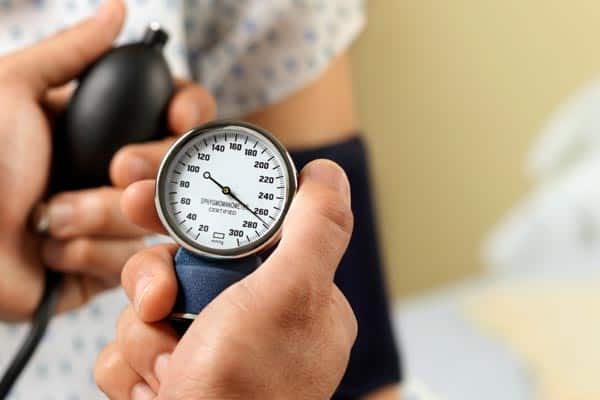If you’ve ever woken up after a night of partying, you probably felt hungover, tired, and aching. You might even feel a sudden, intense pain in your chest.
Chest pain can be a surprising complication of excessive drinking. It usually isn’t caused by the alcohol itself, however.
In most cases, it is a sign that another disease or condition might be present.
In this article, we’ll outline some of the various reasons that your alcohol use might be leading to aches or cramps in your chest.
Here is a video for you if you like to see things rather than read!
Summary: What Causes Chest Pain After Drinking?
- There is a clear link to alcohol use and blood pressure problems.
- Alcohol can trigger or aggravate several serious medical conditions.
- Alcohol use can lead to acute or chronic pancreatitis, a painful and incurable illness.
- Alcohol could be making your medications less effective.
- Using alcohol to deal with pain could be backfiring on you.
- There are other causes of alcohol-related chest pain.
- There is good news about moderate alcohol consumption.
Heavy drinking has been linked to dozens of serious diseases. In the case of your chest pains, there are some alcohol-related conditions that could be causing them.

Alcohol is Linked to High Blood Pressure
There is a strong correlation between drinking alcohol and elevated blood pressure levels. So many people report heart palpitations after a weekend of partying that researchers and doctors coined the term “holiday heart” to describe this phenomenon.
As it turns out, the holiday heart is real. According to various studies, regular consumption of alcohol can lead to swings in blood pressure.
In cases of excessive or binge drinking, that change might become permanent.
For most of the researchers, regular consumption was defined as three drinks per day.
Here are some of the key findings based on studies of healthy people who consumed that amount of alcohol.
High Blood Pressure
- High blood pressure was observed in people who had three or more drinks per day.
- About half of chronic alcoholics have a blood pressure reading of 160/90.
- Blood pressure might spike slightly during alcohol withdrawal.
- Drinkers who combine wine or beer with MAO-inhibiting antidepressants could see dangerous spikes in their blood pressure.
- Long-term alcohol abuse can lead to permanently high blood pressure.
- Withdrawing from alcohol will allow the blood pressure to return to normal within a week.
Low Blood Pressure
- People with blood-alcohol poisoning also experience extremely low blood pressure levels.
- People with an ALDH2 deficiency, meaning they lack the genetic ability to process alcohol, will also suffer severe blood pressure drops.
Why Does High Blood Pressure Matter?
High blood pressure is a chief contributor to heart disease, stroke, and other neurovascular problems. Chronic, untreated high blood pressure can lead to heart disease and many other conditions.
If you’re experiencing frequent heart palpitations, especially after drinking, you should consult a doctor to determine what’s causing it. It might not be anything serious, but it’s better to know.
Certain Illnesses and Conditions are Caused or Aggravated by Alcohol Use
Drinking to excess can lead to more than just a few rough mornings. If you regularly binge drink or wake up hungover, you could be setting yourself up for a major medical problem down the road.
According to WebMD, longtime alcohol abuse can increase your risk of developing several serious illnesses. These are all conditions whose symptoms include chest pains.
Cardiomyopathy
This medical term means “weak heart.” If your heart is starting to fail, it will be unable to circulate blood or oxygen and you’ll be on the road to a heart attack. Cardiac myopathy is an early-stage heart disease that requires aggressive treatment.
Alcoholic Cardiomyopathy
This is a specific type of cardiomyopathy caused by years of heavy drinking. It can occur after several years of drinking seven or more drinks each day. Alcoholic cardiomyopathy usually affects heavy drinkers in their 40s.
Watch this YouTube Video from Dr. Kevin O’Hara that explains in detail the symptoms, treatment, and outlook for alcoholic cardiomyopathy.
Atrial fibrillation
In this condition, the heart begins beating out of rhythm, causing irregular heartbeat and blood pressure swings that could lead to a heart attack or stroke.
Ventricular fibrillation
In this condition, blood vessels are not able to process oxygen. Left untreated, it can lead to unconsciousness and heart failure.
Could You Have One of These Illnesses?
If you’re concerned that you might be suffering from one of these conditions, your best bet is to visit a doctor’s office or walk-in clinic and request a full physical. You’ll get an early warning of any conditions that warrant your attention.

Upper Abdominal Pain Could be Pancreatitis
If your pain begins in your abdomen and then moves to your chest and back, it could be an early warning sign of pancreatitis. Pancreatitis is an incurable disease that is mostly caused by excessive use of alcohol.
According to the Mayo Clinic, the symptoms of acute pancreatitis include:
- Upper abdominal pain
- Pain that radiates to your back
- Fever
- Nausea or vomiting
Repeated bouts of pancreatitis will create permanent damage to your pancreas and can result in several serious complications.
Because a damaged pancreas cannot produce insulin, you could end up with any of these additional diseases caused by poor or insufficient insulin.
These include conditions you might not have had before, such as:
- Diabetes
- Infection and internal bleeding
- Breathing problems
- Malnutrition
If you’re experiencing sudden, intense attacks of abdominal pain, consult a doctor before the symptoms and the complications get worse. There is no cure for chronic pancreatitis but its symptoms can be managed.
Alcohol Could Be Making Your Medications Less Effective
If you are already taking prescription medications, drinking large amounts of alcohol might reduce their effectiveness.
This could lead to a worsening of your symptoms and spikes in blood pressure, irregular heartbeat, and the associated chest pains.
According to Dr. Danya Qato, a pharmacologist and researcher at Brown University, “The danger of combining alcohol and some medications are real and sometimes fatal.”
Blood Pressure Medications
Alcohol does not mix well with blood pressure medications. People who take beta-blockers while consuming alcohol can experience abnormal heart rhythms, chest pains, and even heart failure.
On the other hand, consuming alcohol while taking angiotensin-converting enzyme (ACE) inhibitors can result in extremely low drops in blood pressure.
Neither situation is good. If you are taking medication for high blood pressure, ask your doctor if there’s a safe amount of alcohol you can consume.
Cholesterol Medications
Statins are a popular cholesterol medication. Taking them along with moderate amounts of alcohol is usually safe, as long as you follow the government guidelines of one or two drinks per day.
The risk with statins is that they can affect liver function. If you consume high amounts of alcohol every day or have a history of binge drinking, this can double the effect on your liver.
Are You Using Alcohol as an Analgesic?
Do you turn to alcohol as a way to deal with physical pain? Occasionally using alcohol in this way probably won’t hurt you, but if you’re consuming alcohol in response to chronic pain, you could be creating more problems for yourself.
According to the National Institute on Alcohol abuse and Alcoholism, using alcohol as an analgesic is dangerous for several key reasons.
- In order for it to work at dulling pain, you need to consume very high levels of alcohol.
- You eventually develop a tolerance to its effects and will require even higher dosages.
- Mixing alcohol with pain relievers such as aspirin and acetaminophen can increase your risk of developing liver disease and gastric bleeding.
These conditions could also increase your blood pressure, lead to heart palpitations, and aggravate any medical conditions you might have.

What Are Some Other Causes of Alcohol-Related Chest Pain?
Hormonal Problems
Hormonal spikes put stress on your body and can affect your health in a number of ways. Chest pains, leg pains, and other bodily aches can all result from these hormonal troubles.
Here are some of the key hormones affected by alcohol use:
Epinephrine
According to the US National Library of Medicine, Research has found that years of alcohol consumption can lead to spikes in your levels of the hormone epinephrine. This hormone is also known as adrenalin.
Adrenalin stimulates the “fight or flight” response and is accompanied by a rapid heartbeat and spikes in blood pressure.
Constantly stimulating your adrenalin to spike will put pressure on your heart and blood vessels.
Cortisol
Cortisol is known as the “stress hormone.” Elevated levels of this hormone in your system have been linked to weight gain, a strain on the heart, elevated blood pressure, and even premature aging.
You probably know what’s coming next. That’s right. Ever since 1999, researchers have established a direct link between high levels of alcohol consumption and high increases in cortisol levels. This has been established in multiple studies.
Spikes in cortisol have also been observed in people who withdraw from alcohol. This explains the anxiety associated with alcohol withdrawal.
Testosterone
Moderate drinking causes a slight increase in the male sex hormone testosterone. But heavy drinking over the years leads to marked decreases in testosterone levels for men.
Low testosterone levels in men can lead to many unwanted side effects including the development of male breasts, low sperm count, and erectile dysfunction. Chronic male drinkers reported low levels of blood testosterone.
Ironically, female chronic drinkers had the opposite result. They had high levels of blood testosterone.
High levels of testosterone in women can lead to excessive facial hair, weight gain, and other negative side effects.
Testosterone levels drop in both men and women during alcohol withdrawal and then return to normal after a period of abstinence.
Sleep Problems
Many people claim that they need alcohol in order to fall asleep. We’re all familiar with the drinker who “passes out” after a night of heavy boozing. But in reality, regularly using alcohol to fall asleep is a bad idea.
Alcohol deprives you of REM (rapid eye movement) sleep, which is the deep sleep that your body needs to restore itself.
Lack of proper sleep is well-established as contributing to numerous physical, emotional, and mental health problems.
Is There Any Good News Here?
There is. You don’t have to cut out all alcohol. In fact, that might not be the healthiest choice. Some medical researchers believe that consuming a small amount of alcohol is better for you than total abstinence.
In this YouTube video, Dr. Marc Gillinov, a heart surgeon with the Cleveland Clinic, explains why he believes it’s healthy to have one glass of wine or beer each day.
Gillinov says that the debate between the type of alcohol you consume is irrelevant. He states that despite the idea that red wine is healthier than white. It’s his view that “It’s the alcohol itself that is heart-healthy.”
Moderation is Key
While Dr. Gillinov says, “Drink up!” Dr. Scott Davis, a cardiologist at Baptist Health Medical Center in Arkansas, reminds us that moderation is key.

Dr. Davis breaks down the effects of alcohol consumption on your heart and explains the link between alcohol abuse and heart disease. You can see his interview.
What You Need to Know About Alcohol and Chest Pains
- Heart palpitations are common after a bout of heavy drinking.
- Moderate drinking is probably healthy for your heart.
- Excessive drinking has direct links to serious illnesses like alcoholic cardiomyopathy and pancreatitis.
- If you’re being treated for high blood pressure or cholesterol, ask your doctor if you should drink alcohol.
- To be on the safe side, enjoy alcohol in moderation.
